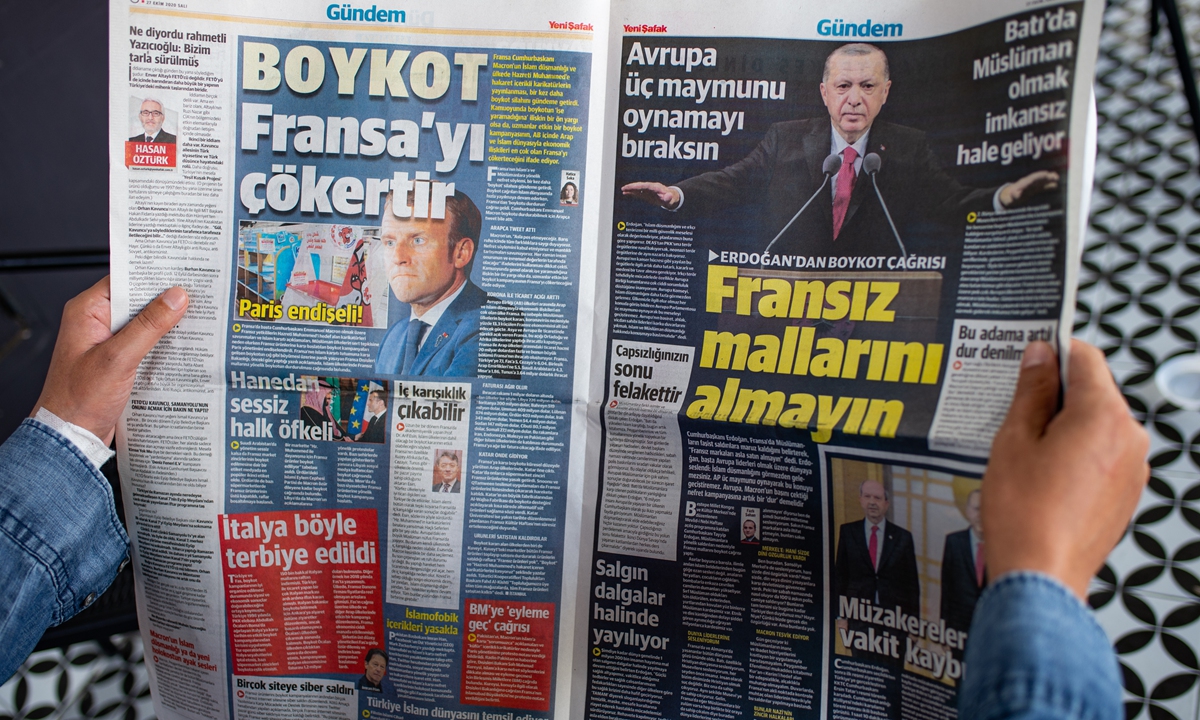France-Turkey disputes roiling European and Mediterranean affairs
By He Zhigao Source: Global Times Published: 2020/10/28 22:28:37

This picture taken on October 27, 2020 in Istanbul shows inside pages of the Pro-government newspaper Yeni Safak calling for a boycott of French goods. Turkish President on October 26, 2020 joined calls for a boycott of French goods, ramping up a standoff between France and Muslim countries over Islam and freedom of speech. Photo: AFP
In the wake of recent tensions between France and Turkey, Paris has recalled its ambassador to Ankara after President Recep Tayyip Erdogan criticized France for cracking down on radical Islam. This is more than just a geopolitical conflict between the two countries. It also reflects differences in values, norms, and even the strategic vacuum left by US global strategic adjustments.Firstly, French President Emmanuel Macron is under pressure to take tough measures against extreme religion at home. The decapitation of French history teacher Samuel Paty has stimulated the government to step up its fight against extremists. Given that France is the country with the largest Muslim population in Western Europe, accounting for nearly nine percent of its total population, Macron's toughness has deepened Muslim immigrants' awareness of inequality and further strengthened the role of religious beliefs as the basis of their identity.
More importantly, Macron's move has aroused opposition and doubts in some Muslim countries. Macron announced that he would investigate 51 French Muslim organizations and institutions, including religious schools and mosques. He also views the French teacher as a symbol of secularism and freedom of expression. Despite Turkey's self-proclaimed European identity, the country's large Muslim population has long been viewed as an outlier and a source of unease in France. France has failed psychologically and seemingly to ever embrace Turkey. It is also consistent with France's attitude of not supporting EU's blind expansion. Paris believes the Brussel's single market has reached a certain scale. Meanwhile, rising tensions between the EU and Turkey, along with the refugee crisis, border issues will inevitably surface.
Secondly, tensions between Paris and Ankara are on the rise in major regional hotspots. In Libya, the two countries support different factions in local civil war. In the eastern Mediterranean, Paris' support for Athens over energy exploration also conflicts with Ankara. It is clear that France wants to maintain unity within the EU and win the unanimity of member states on foreign issues. The country has also held joint military exercises with Greece in the eastern Mediterranean Sea, covering the area of the Greek-Turkish conflict, namely the islands of Kastellorizo. Although both France and Turkey are NATO members, it is difficult to resolve their differences within the framework of the organization. In general, the differences and conflicts between France and Turkey have become more complicated, as Ankara attempts to become a major regional power and Paris tries to become a dominant player in the Mediterranean region.
Third, the decline of US' influence in Europe has, to some extent, created a strategic vacuum around the Mediterranean region. Faced with the withdrawal of the US in the Middle East and its extraterritorial sanctions imposed on countries in the region, Europe has repositioned its regional policy. The security situation in the Middle East is more likely to get worse than better. For example, the fight for resources will intensify and weaker countries will lose more leverage.
According to EU Global Strategy issued in 2016, the peripheral region is EU's main strategic focus, especially the Mediterranean region. In part, this is because a large number of refugees swarmed across the Mediterranean into Europe after outbreak of wars in Libya and Syria. But the EU, lacking a common strategy and sufficient hard power to respond, has become a bystander of the Middle East issues to some degree.
France, as one of the key countries leading the EU's strategic autonomy and European defense integration, expects to play a dominant role in Mediterranean. It seeks to build close military ties with other countries and ensure its capacity for peaceful national development. This challenge takes place amid a background of growing turmoil in the Middle East.
Therefore, France is increasing military contacts in Mediterranean in order to contain potential security risks. It is also trying to change countries in the region through norms and ideas in order to nip extremist forces in the bud.
France-Turkey tensions show stark differences regarding values. It is a result of geostrategic competitions and French domestic political pressure.
In general, such friction will not be readily abated. Resolving disagreements, seeking consensus, and maximizing common interests will test the political wisdom of both countries - and all parties concerned.
The author is a research fellow with the Institute of European Studies, Chinese Academy of Social Sciences. opinion@globaltimes.com.cn
Posted in: VIEWPOINT